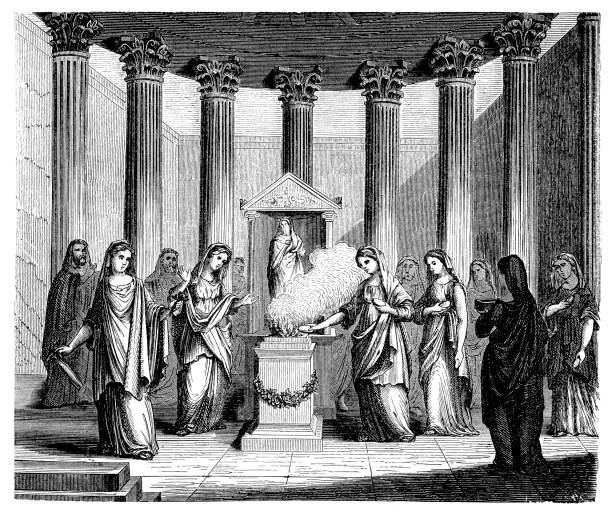Culture
How Did Ancient Romans Worship Their God’s?

Ancient Roman religion was a complex system of beliefs, rituals, and practices that shaped every aspect of Roman life. The religion of the ancient Romans was polytheistic, meaning they worshipped multiple gods and goddesses, each of whom presided over different aspects of life and the natural world. Here is a detailed overview of the religion practiced by the ancient Romans:
1. Polytheism: The ancient Romans believed in a pantheon of gods and goddesses, with each deity having a specific role and domain. Some of the most important Roman gods included Jupiter, Juno, Neptune, Minerva, Mars, Venus, and Mercury. These gods represented celestial bodies, natural forces, aspects of human life, and other elements of the Roman world.
2. Cult of Ancestors: Ancestor worship was an integral part of Roman religious practice. The Romans believed in the importance of honoring and appeasing the spirits of their ancestors, seeking their guidance and protection in daily life. Ancestral tombs and monuments played a significant role in Roman religious rituals.
3. State Religion: The Roman state religion was closely tied to the political and social structure of Roman society. The emperor served as the high priest of the state religion, overseeing important religious ceremonies and ensuring the favor of the gods for the well-being of the empire.
4. Public Rituals and Festivals: The ancient Romans celebrated a wide range of religious festivals and rituals throughout the year. These events often involved elaborate ceremonies, sacrifices, processions, and feasts to honor specific gods and goddesses. Some of the most famous Roman festivals included Saturnalia, Lupercalia, and the Ludi Romani.
5. Household Gods: In addition to public worship, Roman households also maintained domestic altars and shrines dedicated to the household gods, known as the Lares and Penates. These deities protected the family, home, and personal belongings, and were honored with daily offerings and prayers.
6. Divination and Omens: The ancient Romans placed a great emphasis on divination and interpreting omens as a means of communicating with the gods and predicting the future. Augurs, haruspices, and other priests specialized in observing signs and interpreting messages from the divine.
7. Temples and Religious Structures: Roman religion was closely associated with architectural structures such as temples, altars, and sacred precincts. Temples dedicated to specific gods were constructed throughout the Roman Empire, serving as focal points for religious worship and communal gatherings. These temples were adorned with elaborate sculptures, decorations, and inscriptions, showcasing the grandeur and importance of the Roman gods.
8. Roman Mythology: The religious beliefs of the ancient Romans were intertwined with mythology, which provided narratives and explanations for the origin of the gods, the world, and human beings. Myths and legends played a significant role in shaping Roman religious practices and rituals, as well as in the arts and literature of the time.
9. Mystery Cults: In addition to the official state religion, the ancient Romans also participated in various mystery cults and religious movements that offered specialized teachings, rituals, and promises of salvation or spiritual enlightenment. These cults, such as the cult of Mithras or the Eleusinian Mysteries, attracted followers seeking a deeper connection to the divine.
10. Decline and Transformation: Over time, the religious landscape of the Roman Empire underwent significant changes, influenced by social, political, and cultural factors. The rise of Christianity in the 4th century CE marked a major shift in religious beliefs and practices, eventually leading to the decline of traditional Roman paganism.
Despite the eventual decline of ancient Roman religion, its influence and legacy continue to resonate in Western culture and spirituality. The rich tapestry of beliefs, rituals, and traditions practiced by the ancient Romans reflects a civilization deeply connected to the divine forces of nature, history, and the cosmos.
-

 Breaking News3 years ago
Breaking News3 years agoBREAKING: CBN Redesigns Naira Notes
-

 Breaking News2 years ago
Breaking News2 years agoBREAKING: Tinubu Considers Temporary Subsidy On Petrol
-

 Breaking News2 years ago
Breaking News2 years agoJUST IN: Gbajabiamila Dies In UK
-

 News3 years ago
News3 years agoDrama As Church Gives Certificate Of Virginity To Ladies After Testing Them (See Photos)
-

 Crime4 years ago
Crime4 years agoUproar As Student Teacher On Teaching Practice Impregnates 24 Girls, Headmistress, Four Female Teachers
-

 Breaking News10 months ago
Breaking News10 months agoJUST IN : Sacked Osun LG Chairman Killed Few Minutes After Returning To Office
-

 Breaking News2 years ago
Breaking News2 years agoBREAKING: Dangote Speaks As BUA Reduces Price Of Cement
-

 Crime3 years ago
Crime3 years agoJUST IN: Gunmen Storm Osogbo, Kill Man, Daughter Few Hours After His Wife Put To Bed (Photos)
